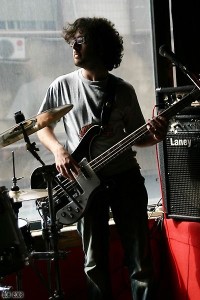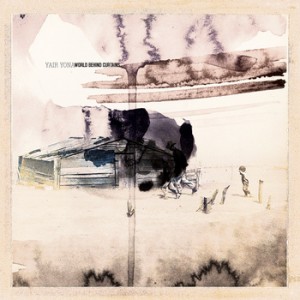Not all songs need lyrics. On his newly released album World Behind Curtains, Israeli musician Yair Yona once again shows his talent for communicating to listeners without saying a single word.

Yair Yona immediately wanted to sell his bass and switch to guitar after buying a Bert Jansch album eight years ago in London. His life changed direction again a few years later when he discovered the instrumental acoustic music of guitarist Glenn Jones.
Yona, who just released World Behind Curtains, his second album for guitar, says his unmapped journey of discovery, frustration, and inspiration has all been worth it and life is better than ever. Although he’s immensely talented on guitar, he doesn’t actually call himself a “guitarist” and identifies more with behind-the-scenes roles in the music world.
It’s not difficult to see where he gets this self image from. In addition to writing, recording, and performing his own music, Yona keeps busy as a co-founder of the music label OutNow Recordings, manager of freestyle saxophonist Albert Beger, and writer/publisher of the music blog Small Town Romance.
World Behind Curtains, at heart an acoustic guitar album with cinematic inspiration, builds on Yona’s first album Remember (2009). Incorporating instruments like electric guitar and french horn and a special mother-son piano/guitar duet, Yona has developed his musical voice in an even further, more meaningful direction.
He spoke with Apsara about the journey leading up to this latest album.
You first discovered fingerstyle guitar when you lived in London studying audio engineering. What drew you to this style of playing?
I played bass in London, and in my dream world I believed that I was going to find a psychedelic rock band, go on tours, and become ridiculously rich and buy more bass guitars. That was the plan anyway.
Then one day when I went into a record store in Camden and stumbled upon Bert Jansch and Jackson C. Frank’s first albums and I bought both of them—I’d never heard of either of them or their music before. There was just something about the album covers that made me curious to pick them up and listen to them. When I first listened to Bert Jansch’s music it immediately felt so familiar. I don’t know how or why—it just sparked my senses. I remember that feeling even today. It was like the excitement of the first time you see the girl of your dreams.
Has fingerstyle guitar been the focus of your music since then?
When I discovered Bert Jansch’s music, I immediately wanted to sell my bass guitar and become an acoustic guitar player. That was it. I’m a person who makes strong decisions and usually goes to the extreme with them. And then I meet myself somewhere in the middle. I didn’t even know how to play except for the basics, but something inside of me just felt so right so I went in that direction.
I don’t actually see myself as an acoustic fingerstyle guitarist, or as a guitarist at all. To me, a guitarist is someone who takes the time to practice for five hours a day, and knows all of the notes, scales, and modes. And I don’t. I have no formal musical education and everything I know about guitar playing serves my music only. If you put me in a band with a guitar in hand, I have no idea what to do with myself. I’m a good guitarist for my music—I think that’s the right definition.
I think art has nothing to do with formal music education. I like to improvise as I go along. But I do think if you know the musical rules and then go and break them you’re in a better position. Still, Paul McCartney’s musical education started later on in his career… I’m feeling good with myself and with the path that I’ve taken. I’ve just followed my heart, and my heart has taken me to where I am now. Things are going great and I’m happier than ever.
 World Behind Curtains is even more of an instrumental album than Remember (2009). Guitar still takes center stage, but there are other instruments, including the violin and piano. How did the idea for this album evolve? What’s the meaning of the title?
World Behind Curtains is even more of an instrumental album than Remember (2009). Guitar still takes center stage, but there are other instruments, including the violin and piano. How did the idea for this album evolve? What’s the meaning of the title?
When I initially thought about how to do the marketing for this album, I thought about tracking down a film director and proposing to make a film for which this would be the soundtrack. It was born out of lots of soundtrack listening hours—lots of Americana and 1970s Italian composers. The music was composed on solo acoustic guitar, and just evolved out of itself in a way.
“World behind curtains” is a phrase that my girlfriend wrote in the first line of a story. Translated from Hebrew it is something like: “The girl looked out of the window and saw the world behind curtains.” I told her: “That’s a good name for an album.” Only later did I learn that in English it can mean “someone behind the curtains.” It somehow fit me perfectly. I was always behind the scenes, as a label manager who was managing artists or as a bass player who wasn’t the focus of the rock band. This is an album that says: “This is a picture of the guy who’s behind the curtains.”
“Expatriates”
You’ve dedicated several songs in the past to musicians who’ve influenced you. On this latest album, for example, you’ve dedicated one track to guitarist Glenn Jones. What has his music meant to you over the years?
When I discovered Bert Jansch’s music and the whole world of British folk music I tried to write songs in English, which isn’t my native language. When I tried to sing it just didn’t sound right to me because of my accent. I kept comforting myself by saying: “Nico had a German accent and that’s okay, it worked for her. And Björk has an Icelandic accent and it works for her, so I can do it too.” But it didn’t feel authentic to me, and I felt I would be lying to myself if I continued that way. I had a couple of hard years because I desperately wanted to be a songwriter, but it didn’t feel right and I was really frustrated by that.
Then by chance in 2006 or 2007 I listened to Glenn Jones’s first album, which was released on Strange Attractors Audio House, the same label as my albums. I had known of him before as the guitarist of Cul de Sac, an experimental rock band I like very much. When I listened to the music on his first album, which was for six- and 12-string acoustic guitar, it made so much sense. He said so much without saying a single word. It just liberated my mind. I listened to the music and said to myself: “You know what? That’s a good way to express yourself. You don’t have to sing.” I didn’t have to prove anything to anyone, I could just do it my own way. It was all thanks to Glenn Jones’s music.
Since then he’s released three more albums, and people are starting to recognize him now. He signed on to a bigger label—Thrill Jockey—and he’s touring. He’s seriously amazing. And he’s been a big supporter of my music. When I finished the work on Remember, I sent it to him on a CD-R before it was released. He wrote me such an amazing note afterward. Reading those words coming from the most important person to me in that field was the ultimate stamp of approval.
In the liner notes for World Behind Curtains, you write that you composed the song “Bella” while watching TV: “The song just poured out in a couple of minutes.” How did this beautiful song, which features your mom on piano, come about?
It was written about two-and-a-half years ago for my previous girlfriend, whose nickname is “Bella.” Someone had bought me a guitar instruction DVD by Kelly Joe Phelps that I was watching. He’s a really amazing guitarist and a soulful singer. I like to watch guitar instruction DVDs because I like to see how guitarists move their hands and how they hold the guitar. I really like to study from other people. He was playing with an unusual tuning: C-G-C-G-C-D. I tried to retune the guitar and that melody just poured out in five seconds. It just wrote itself, and when that happens you feel like you’re the luckiest person on earth, seriously. Then I recorded the demo of that song so I’d have it at home to work on.
My mom was a wonder kid on the piano. But she stopped playing for about 40 years and just returned to it about four or five years ago. I decided that it would be amazing if she’d play piano on the album. I wanted to give her a stamp of approval again. She sees me as her “son the musician.” So I decided to bring her into the studio for the first time in her life, and have her put headphones on and make her part of the process. I was very excited and also very nervous because I was on a tight schedule and had limited time in the studio. Everything had to be quick, but it was very, very exciting. It was a different level of connection between mother and son. She was really happy with the result. She said she loves the album and that it’s so beautiful, but that’s just mom talking.
World Behind Curtains released Feb. 14 from Strange Attractors Audio House. Preview it, and Farthest South, Yona’s latest musical project, on Bandcamp.
